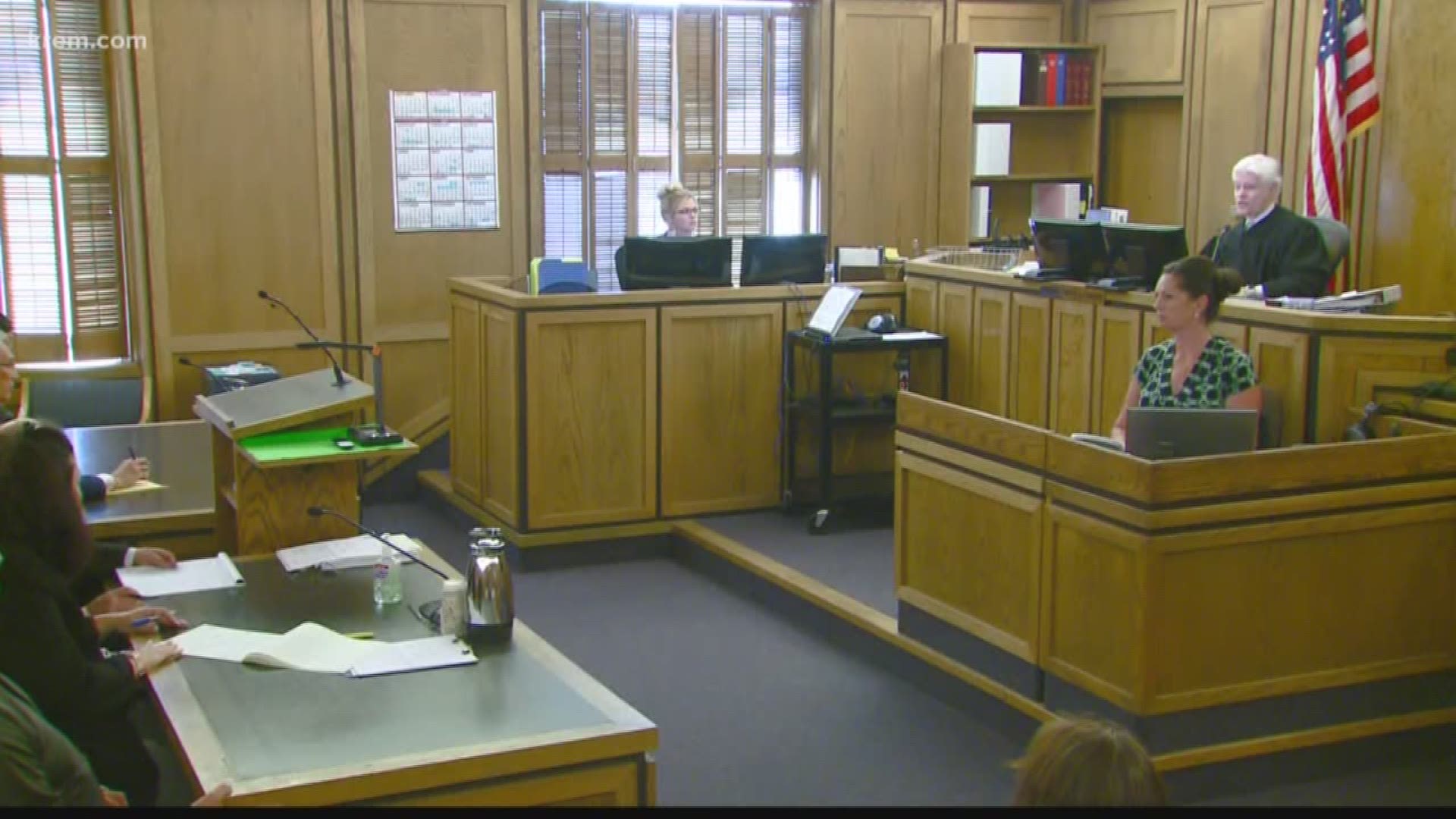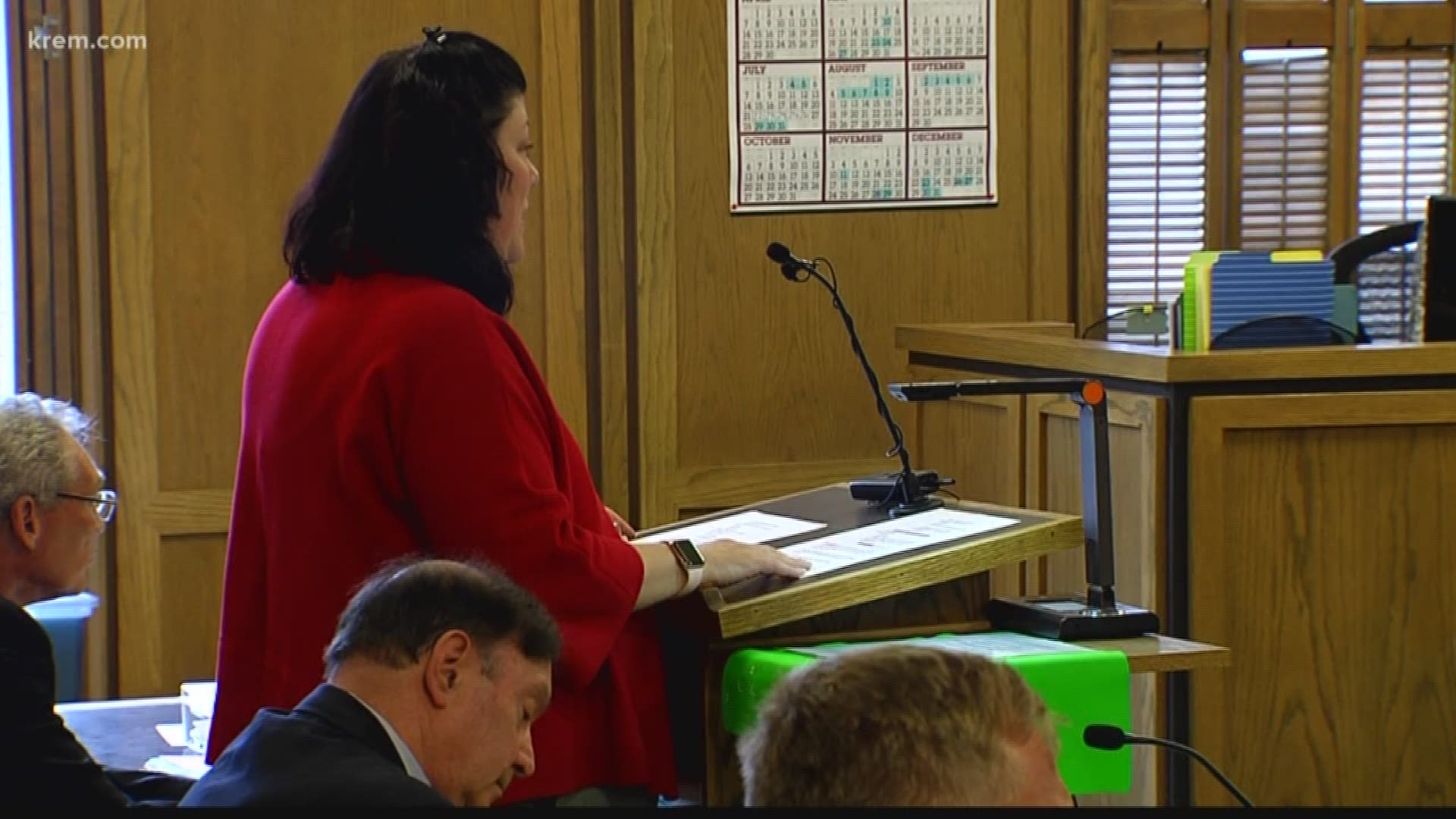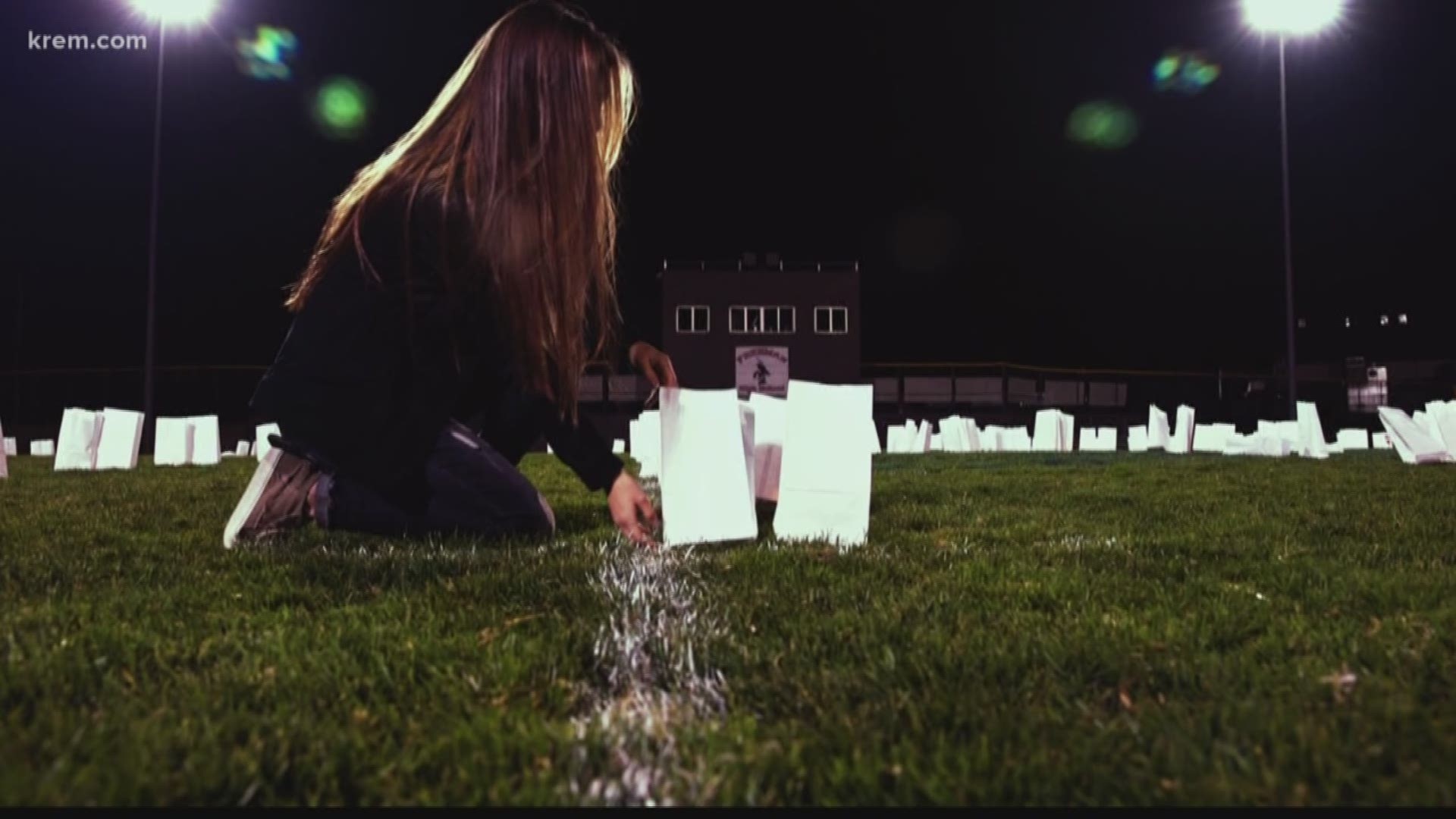SPOKANE, Wash. — A judge ruled Tuesday the Freeman High School shooting suspect will be tried as an adult.
Judge Michael Price made the decision Tuesday afternoon.
Caleb Sharpe, 17, is accused of opening fire in the high school’s hallway in 2017, killing one student, Sam Strahan, and injuring three others. He could now face life in prison.
Sharpe was 15 at the time of the shooting and will soon turn 18 years old. He faces charges of first degree premeditated murder with aggravating circumstances, three charges of attempted first degree murder for the three girls injured in the shooting, and 51 second degree assault charges for other students endangered during the shooting.
Before giving his ruling Judge Price told the courtroom this is the most difficult decision he’s ever made---that’s in the 17 years he’s served as judge in Spokane County Superior Court.
He went through each of the eight Kent factors--the criteria to decide if the accused shooter will be tried as an adult. A majority of those factors he said favored decline— meaning the suspect should be tried as an adult.
He thanked the prosecutors and defense council for their thorough information and representation. The judge said no one can truly know why the suspect did what he did, which is why he said he would speak to what he knows.
Two courtrooms were packed full of people wanting to hear the judge's ruling. As they filed out,it was mostly quiet. Many were hugging and seemed generally pleased with the judge's decision.
At this time , there were no members of the Freeman community wanting to comment.
The accused shooter is scheduled to be arraigned as an adult in Superior Court August 16 at 8:30 a.m.
Closing arguments
Both the defense and prosecution delivered closing arguments on Monday in the suspect's declination hearing, which began last Monday.
Spokane County Prosecutor Larry Haskell delivered his closing statement on Monday morning, including the sentencing structure and Kent Factors that Price must consider in his decision.
"In nearly all aspects, this crime could not, would not have been better planned by an adult. Sophisticated and mature," Haskell said.
Haskell asked Judge Price on Monday to try Sharpe as an adult, adding that last week's testimony "clearly favors" this outcome.
Defense attorney Bevan Maxey delivered a closing argument on Monday morning, asking Judge Price to consider Sharpe's lack of brain development.
Last week, the defense argued that Sharpe suffered brain damage due to a lack of oxygen at birth.
"This is a young man suffering from something he didn't understand. But it was affecting him," Maxey said.
Maxey stood by his argument that his client suffered brain damage resulting from lack of oxygen at the time of birth. Even though the prosecutor's expert witnesses said there is no evidence of this, Maxey said this is a factor proving the accused shooter was not mature or sophisticated at the time of the alleged crime.
However, the state provided birth records and testimony that showed otherwise.
Detective, school psychologist, principal and resource officer testify
The Freeman School District psychologist, high school principal and school resource officer all spoke at the hearing Friday.
Jody Sweeney is the district's psychologist who worked with the accused shooter in previous years. She said there are Freeman students and staff who have left the district since the shooting.
She described the effects of that day as “catastrophic.” Since the shooting, she's noticed Freeman students and staff have been in survival mode and now showing physical and mental exhaustion.
Spokane County Sheriff’s Major Crimes Detective Scott Bonney also took the stand.
In his testimony, the detective said the accused shooter admitted he'd been planning the shooting for about two years.
Janitor testifies on Thursday
Freeman High School janitor Joe Bowen took the stand on Thursday.
The military veteran was hailed as a hero after he confronted the suspected shooter and told him to lie on the ground.
Bowen said he was fixing a toilet in the girls' restroom at Freeman High when he heard several pops. He said he initially thought that a student lit some fireworks or that it was an explosion from the science classroom.
This is the most that Bowen has spoken about the shooting since it happened.
Psychiatrist testifies on Wednesday
The first witness called to testify on Wednesday was Dr. Richard Adler, the defense's psychiatrist who evaluated Sharpe and his parents, Roley said. He performed various tests on the defendant including psychological and MRIs.
Adler said it is his opinion that Sharpe was neither "mature nor sophisticated" at the time of the alleged crime, according to Roley. These are among the Kent factors a judge must consider when deciding if Sharpe will be tried as an adult.
Adler added that it is his belief that Sharpe has potential for rehabilitation, which is also among the Kent factors.
"Circumstances at the time of the subject event, that he was neither sophisticated, nor was he mature. Just the opposite. He was both unsophisticated and immature. On the other eight Kent item I felt as if he had, and subsequent evaluation illustrates he had rehabilitative and has rehabilitative potential. That he has improved and developed as much as can actually be expected," Adler said.
He went on to say other tests on the defendant's brain suggest he has a moderate learning disorder.
The doctor also told the court he believes the accused shooter is capable of meeting rehab improvement goals by the age of 21 within the juvenile system.
Things eventually got heated when Spokane County Prosecutor Kelly Fitzgerald questioned the doctor. She asked about his opinion that the accused shooter suffered a brain injury as a result of lack of oxygen at birth.
"Right, because your vetting involved having a predetermined opinion that you thought would be helpful to your conclusion and then picking apart records without talking to anyone. That's what you've done," Fitzgerald said.
"None of what you've said is correct," Adler replied.
"Explain to me Dr. Adler who you've talked to. Explain to me who you talked to. Did you talk to anybody in this case. Did you talk to anybody in this case Dr. Adler. Yes or no? Did you talk to any of the doctors? Are you refusing to answer my question Dr. Adler," Fitzgerald asked.
"No," Adler said.
"You have a medical degree. You understand the words coming out of my mouth," Fitzgerald said.
The defense the objected to Fitzgerald's statement.
The doctor answered 'no' to her question of whether he spoke to any doctors or experts listed on the defendant's birth records, or in this case.
The hearing will resume Thursday at 9 a.m.
Doctor, Freeman SD bus driver testify on Monday
On Monday, the prosecution called a general pediatric doctor to the stand to discuss Sharpe's birth records. The court also heard testimony from a physical assistant who does sports physicals.
A Freeman School District bus driver took the stand on Monday and described when Sharpe brought a golf club bag onto her bus the day of the shooting.
"He greeted me, I greeted him. He got on and sat down like he had before," Charisma Conklin said. "The difference was struggling with the front luggage and trying to put golf clubs in the bus."
The defense attorney said the juvenile system will be the most effective in helping Sharpe with medical needs.
"We believe that at the conclusion of this the improvements he has made and with the understanding--finally understanding what it is that's been happening with him and inside of him that rehabilitation can occur...and neither the public will need further protection from him," said Sharpe's Attorney Bevan Maxey.
Prosecutors argued that Sharpe understood the consequences of his actions and is asking the judge to try him as an adult.
"His goal was to do the greatest amount of harm to the greatest amount of people, specifically his classmates," said Prosecutor Kelly Fitzgerald.
Prosecutors argued Sharpe has not been cooperating or participating in group therapy. The defense said he's been taking his medications, which are helping him rehabilitate and feel better.
The prosecution has the burden of proof in the hearing. They presented the judge the Kent factors, which are eight factors the judge must consider when deciding if the shooter will be tried as an adult.
Sharpe’s declination hearing to decide whether to charge him as an adult was initially moved from April 2, 2018 to May 21, 2018. In May, the hearing was pushed back yet another time.
Implications of declination hearing
If Sharpe is tried as a juvenile, he will be subject to incarceration until he is 21 without further supervision after he's released. If the judge decides to try him as an adult, he can be sentenced to additional confinement after the age of 21 with post supervision.
Prosecutors said the expert hired to evaluate the teen needed more time to determine whether or not he is capable of rehabilitation, whether he completely understands the nature of his acts, and evaluate his level of capability as well as his emotional and mental well-being.
In May 2018, a prosecutor told KREM that Judge Michael Price would rule on whether he could use statements Sharpe gave to the Spokane County Sheriff's Office.
Some of those statements include how Sharpe watched documentaries about the Columbine High School shootings and flipped a coin to decided whether or not to go through with the shooting.
After the hearing, Sharpe’s case will be moved to adult court or stay in juvenile court, depending on the outcome.
If Sharpe is tried in juvenile court, prosecutors could not push for a life sentence without parole. In Oct. 2018, a split Washington Supreme Court ruled that sentencing juveniles to life without parole is unconstitutional.
In response to that ruling, the Washington Legislature eliminated mandatory life sentences for juveniles under age 16 convicted of aggravated first-degree murder and required sentencing courts to take into account mitigating factors before sentencing anyone age 16 or 17.
KREM reporter Amanda Roley contributed to this report.



